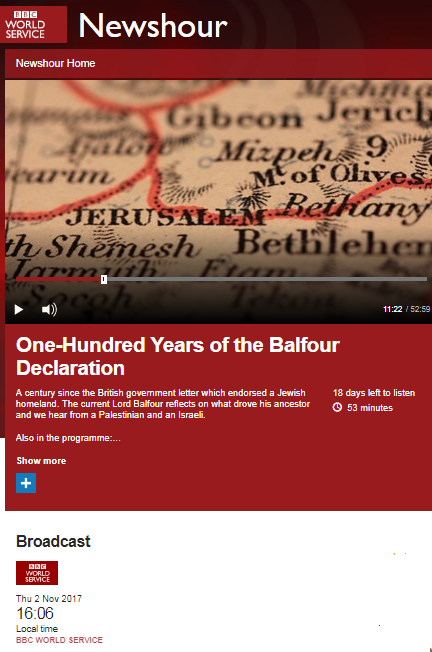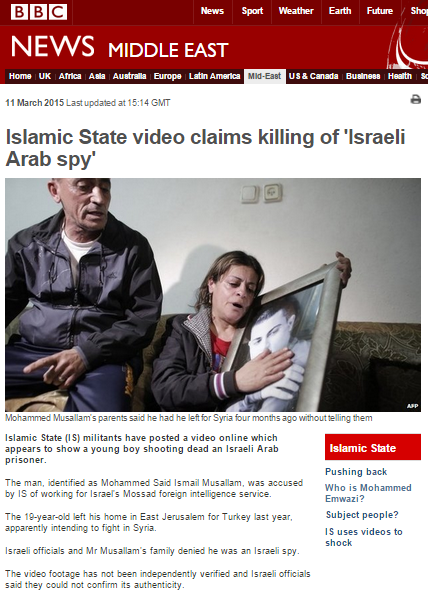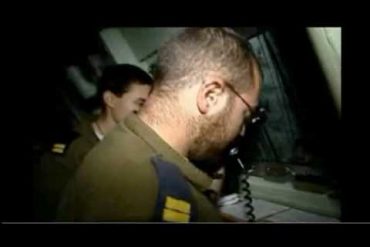On March 4th the BBC News website published a report on its Europe page titled “Rue des Rosiers: France seeks three men for 1982 attack“.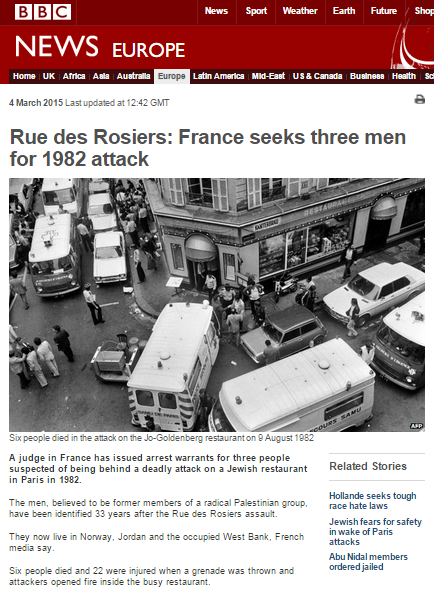
The report relates to the issue of arrest warrants for three men suspected of having been among those responsible for the terror attack on the Jo Goldenberg restaurant in Paris in which six people were killed and 22 wounded. The wording used by the BBC to describe both the Abu Nidal Organisation, on behalf of which the suspects allegedly carried out the terror attack, and the attack itself conforms to the corporation’s usual template of avoidance of the use of the word terror. [emphasis added]
“A judge in France has issued arrest warrants for three people suspected of being behind a deadly attack on a Jewish restaurant in Paris in 1982.
The men, believed to be former members of a radical Palestinian group, have been identified 33 years after the Rue des Rosiers assault.” […]
“Two of the wanted suspects are believed to have been the gunmen who stormed the Jo-Goldenberg restaurant and delicatessen on 9 August 1982 …” […]
“The third suspect, a 64-year-old living in Jordan, is suspected of having a commanding role in the attack, Paris Match said. Other reports gave different ages for the men.
The three men are said to have belonged to a group led by Palestinian militant Abu Nidal, which was active in the 1970-80s.” […]
Right at the end of the report, readers are informed that:
“Abu Nidal – whose real name was Sabri Banna – died in Iraq in 2002, reportedly committing suicide.
For decades he was regarded as a terrorist and a wanted man – inside the mainstream Palestinian community as much as in the world at large.” [emphasis added]
The Abu Nidal Organisation was not merely “regarded” but in fact officially designated a terrorist organization by the EU, the US and Israel. The approach adopted by “the mainstream Palestinian community”, as it is termed by the BBC, was not however the result of a similar view of the terror attacks carried out by the organization as readers may understand from the phrasing of that sentence, but in fact stemmed from internal disputes.
“After the attack on the Saudi Embassy in Paris, Abu Nidal effectively split with Mr. Arafat, and began trying to take over Al Fatah by forming his own group called Fatah Revolutionary Council. This split was formalized in June 1974 after Mr. Arafat pushed a resolution through the Palestine National Council, the P.L.O.’s parliament, authorizing the P.L.O. to establish a state ”on any Palestinian territory that is liberated.”
In October 1974, Abu Nidal dispatched a ”hit team” to Damascus to assassinate Mr. Arafat and the P.L.O. treasurer, Abu Mazen. The team was captured by Syrian and P.L.O. guards. The P.L.O held a trial and sentenced Abu Nidal to death in absentia for attempting to kill the P.L.O. chairman.”
The BBC report also informs readers that:
“The Abu Nidal group is blamed for a series of attacks across the world, which left at least 900 people dead.”
Readers are not informed of the origin of that cited number of casualties, but most sources (for example the CFR, TRAC and Israeli terrorism expert Ariel Merari) put the number of people murdered by the Abu Nidal organization at around 300 and some – including most media organisations – cite the number 900 as an estimate of the total number of people killed or injured by that terrorist organization.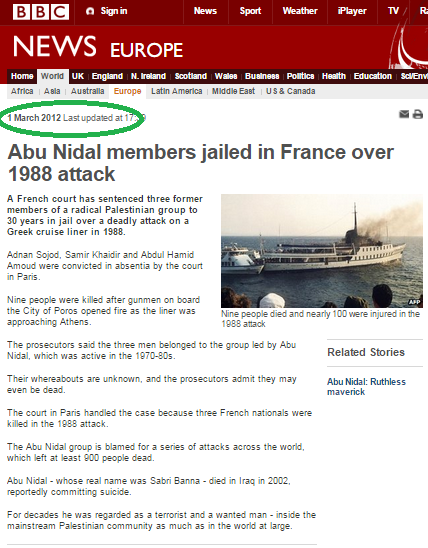
Interestingly, that same unsourced number – together with some of the same phrasing used in this latest report – can also be found in a previous BBC report from March 2012 which appears as a link in the sidebar.
“The Abu Nidal group is blamed for a series of attacks across the world, which left at least 900 people dead.
Abu Nidal – whose real name was Sabri Banna – died in Iraq in 2002, reportedly committing suicide.
For decades he was regarded as a terrorist and a wanted man – inside the mainstream Palestinian community as much as in the world at large.”
Clearly fact checking did not take place before that three year old information was recycled.

